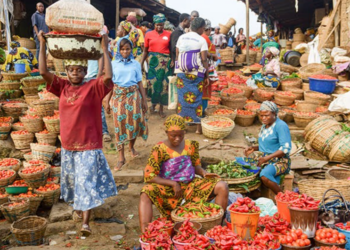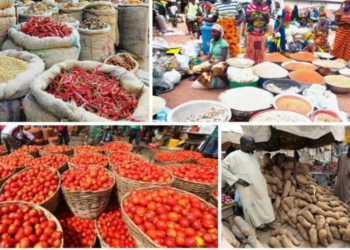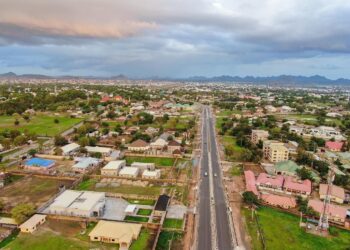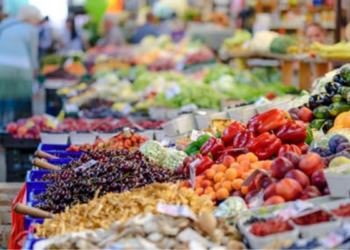Nigeria’s inflation rate for the month of March 2020, rose to 18.17% from 17.33% recorded in February 2021. This represents 0.82% points higher than the February figures.
This is according to the Consumer Price Index report, recently released by the National Bureau of Statistics (NBS).
On a month-on-month basis, the Headline index increased by 1.56% in March 2021, this is 0.02% points higher than the rate recorded in February 2021 (1.54 percent).
Food inflation
Food inflation, a closely watched index spiked to 22.95% from 21.79% recorded in the previous month.
- On a month-on-month basis, the food sub-index increased by 1.9% in March 2021, up by 0.01% points from 1.89% recorded in February 2021.
- The rise in the food index was caused by increases in prices of Bread and cereals, Potatoes, yam, and other tubers, Meat, Vegetables, Fish, Oils and fats, and fruits.
- Also, the average annual rate of change of the Food sub-index for the twelve-month period ending March 2021 over the previous twelve-month average was 17.93%, representing 0.68% points from the average annual rate of change recorded in February 2021 (17.25%).
Core inflation
The ”All items less farm produce” or Core inflation, which excludes the prices of volatile agricultural produce rose to 12.67% in March 2021, up by 0.29% when compared with 12.38% recorded in February 2021.
- On a month-on-month basis, the core sub-index increased by 1.06% in March 2021. This was down by 0.15% when compared with 1.21% recorded in February 2021.
- The average 12-month annual rate of change of the index was 10.01% for the twelve-month period ending March 2021; this is 0.76 percent points lower than 10.77% recorded in February 2021.
- The highest increases were recorded in prices of Passenger transport by air, Medical services,
Miscellaneous services relating to the dwelling, Passenger transport by road, Hospital services, Passenger transport by road. - Others include; Pharmaceutical products, Paramedical services, Vehicle spare parts, Dental services, Motor cars, Maintenance and repair of personal transport equipment, and Hairdressing salons and personal grooming establishment.
Meanwhile, the urban inflation rate rose to 18.76% (year-on-year) in March 2021 from 17.92%
recorded in February 2021, while the rural inflation rate jumped to 17.6% in March 2021 from 16.77% in February 2021.

State inflation rate
- In March 2021, all items inflation on year on year basis was highest in Kogi (24.51%), Bauchi (22.24%), and Sokoto (20.70%), while Imo (16.08%), Kwara (15.34%), and Cross River (14.45%) recorded the slowest rise in headline Year on Year inflation.
- In terms of food inflation, on a year on year basis was highest in Kogi (29.71%), Sokoto (27.02%), and Ebonyi (26.59%), while Abuja (20.10%), Kebbi (19.98%), and Bauchi (18.61%) recorded the slowest rise .in year on year inflation.
What this means
- The galloping nature of Nigeria’s inflation is an indication of the dwindling purchasing power of Nigerians.
- This implies that Nigerians spent more on purchasing goods and services in the month of March, compared to February.
- The last time Nigeria recorded an inflation rate higher than 18.17%, was in January 2017 when headline inflation stood at 18.72%.























and there’s no sigh this inflated price be slowing down.
Nice one Bro Iyk dat